
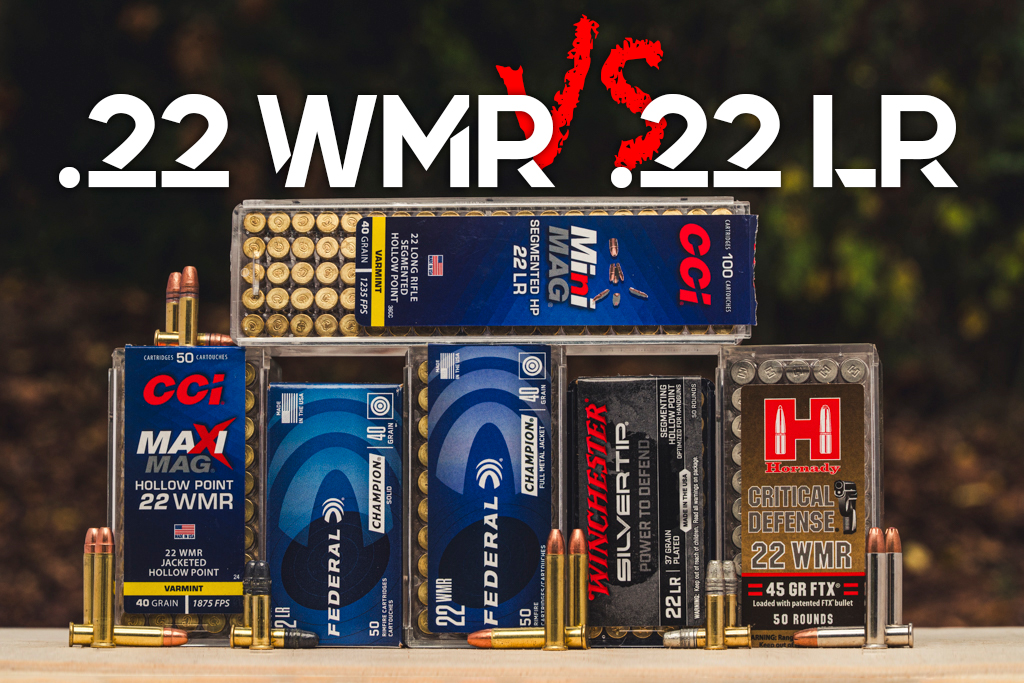
Rimfires generally need little in the way of introduction; 22 LR VS 22 WMR included. We most likely all cut our collective shooting teeth on them. More accurately, we all most likely cut our teeth on a .22 Long Rifle (.22LR) firearm. They are the best primers for shooting: relatively quiet, very cheap, accurate, and fun.
They are also very efficient slayers of rabbits, squirrels, nuisance birds, and a whole host of other small vermin. However, the venerable .22LR has a big brother who likes to lift weights and punch littler vermin in the mouth: the .22 Winchester Magnum Rimfire (.22 WMR), known widely as the .22 Magnum. Let’s have a look at the venerable classic and its punchy featherweight big brother.
History & Data
The 22 LR and its bigger brother, the 22 WMR, both have humble beginnings. If you’re a history buff like me, you like to know a bit about a cartridge’s origins, not just how it performs. The .22 LR traces its lineage to the .22 BB Cap, developed around 1845. From there it grew into the .22 short (in 1857), then graduated to the .22 Long (in 1871).
Hunters and varminters wanted a rimfire round with true rifle-level performance. .22LR wasn’t cutting it for them, so in 1959, the .22 WMR was born. It offered a flatter trajectory, with more energy and better penetration. If your target is 100 yards or beyond, it’s a much more effective option than the .22LR.
| Cartridge Specs | .22 Long Rifle | .22 WMR |
|---|---|---|
| Parent Casing | .22 Long | .22 Win Rimfire |
| Bullet Diameter | .223“ | .224“ |
| Neck Diameter | .226″ | .243″ |
| Base Diameter | .226″ | .245″ |
| Case Length | .613″ | 1.05″ |
| Overall Length | .888″ | 1.35″ |
| Grain Weight | 29gr-60gr | 30gr-50gr |
| Max Pressure (SAMMI) | 24,000 PSI | 24,000 PSI |
22 LR VS 22 WMR: Rimfire Shootout
Federal Champion LRN .22LR VS. Federal Champion FMJ .22 WMR
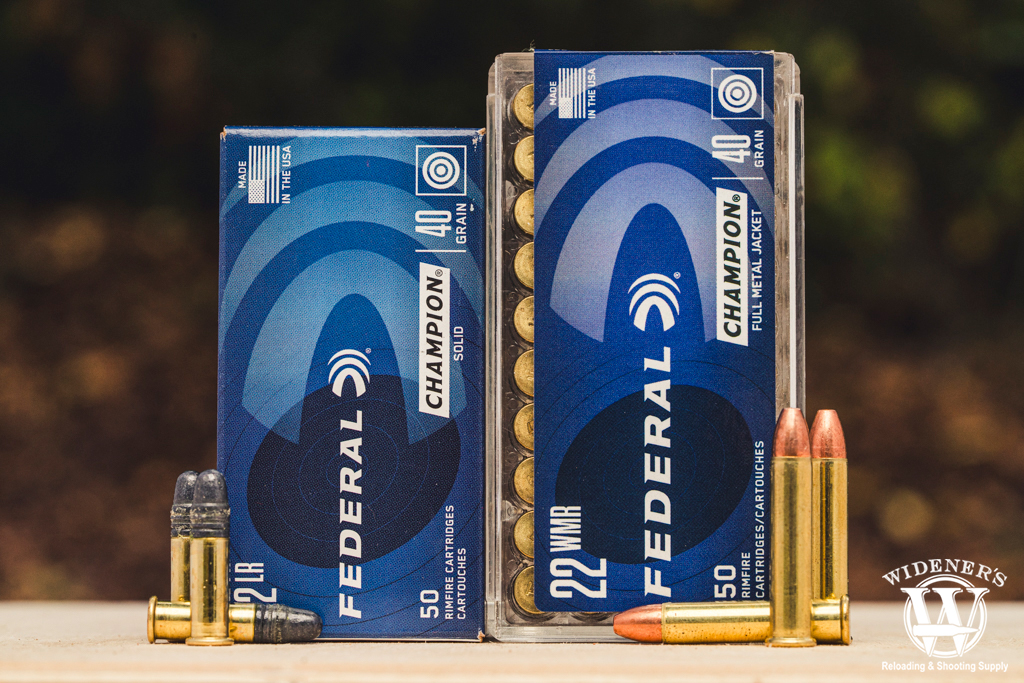
Champion VS Champion: Federal’s .22 WMR 40gr FMJ outperforms their .22LR 40gr FMJ in everything but price.
Federal Champion is affordably priced and reliable, making it a great option for recreational shooting.. For many, it’s a go-to option when it’s time for training and plinking. Over the years, the name has become synonymous with the world of rimfire competition. Don’t be surprised to find this budget option in many a competitor’s range bag.
22 LR: Federal’s LRN bullets are perfect for plinking and training at the range, or sighting in a new pistol or rifle optic.
22 WMR: In .22 WMR, these full metal jackets hit targets hard. It’s your best bang for the buck in terms of pricing.
| Caliber | Bullet Type | Bullet Weight | Velocity (Muzzle) | Energy (Muzzle) | 50 Yards (Velocity/Energy) | 100 Yards (Velocity/Energy) | 150 Yards (Velocity/Energy) |
|---|---|---|---|---|---|---|---|
| .22LR | FMJ | 40gr | 1,240 FPS | 137 FT LBS | 1,103 FPS/108 FT LBS | 1,011 FPS/91 FT LBS | 944 FPS/79 FT LBS |
| .22 Mag | FMJ | 40gr | 1,880 FPS | 314 FT LBS | 1,1570 FPS/219 FT LBS | 1,311 FPS/153 FT LBS | 1,121 FPS/112 FT LBS |




CCI Mini-Mag SHP Varmint .22LR VS. CCI Maxi-Mag Varmint JHP .22 WMR
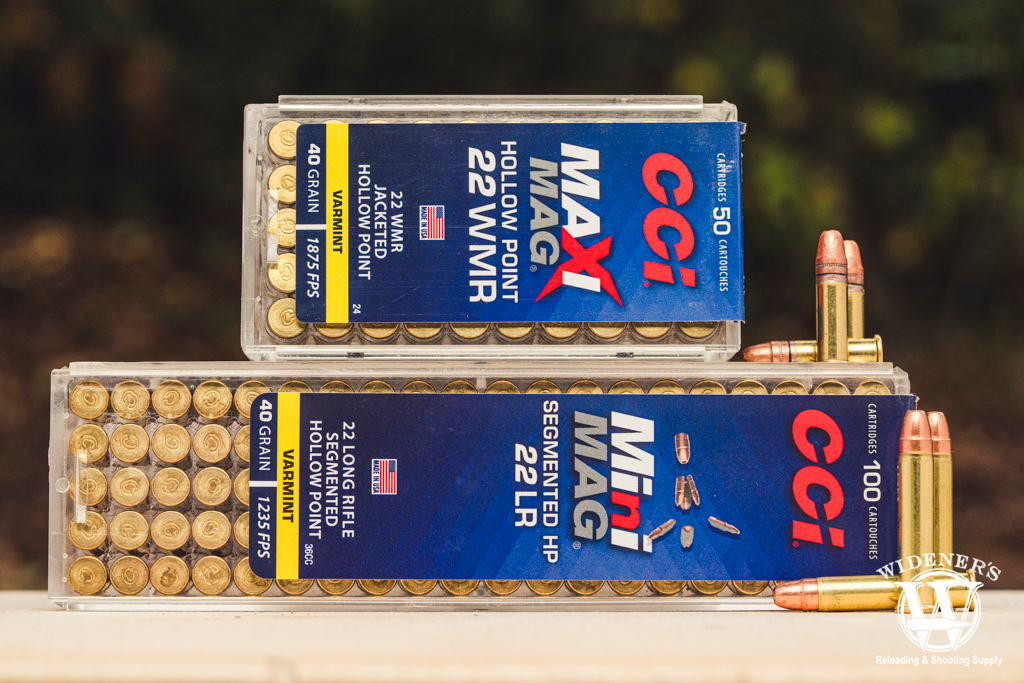
JHP VS SHP: CCI’s .22 WMR JHP is about 145% more powerful (in energy) than the CCI Mini-Mag in .22LR.
The folks over at CCI know a thing or two about varmint control. They’ve been at it since 1951, in the hills of Lewiston, Idaho. If rats, or other small vermin, are driving you batty, their segmented .22lr is among the best in the industry. It delivers enough of a pop to eliminate most common pests. If you need to reach out and touch a quadruped from a safe distance, their .22 WMR JHP option will drop a rabid coyote in its tracks.
22 LR: CCI’s Mini-Mag segmented bullet delivers rapid expansion and explosive fragmentation on impact.
22 WMR: CCI’s Maxi-Mag features a jacketed hollow-point bullet design that transfers tremendous energy to the target.
| Caliber | Bullet Type | Bullet Weight | Velocity (Muzzle) | Energy (Muzzle) | 50 Yards (Velocity/Energy) | 100 Yards (Velocity/Energy) | 150 Yards (Velocity/Energy) |
|---|---|---|---|---|---|---|---|
| .22LR | SHP | 40gr | 1,235 FPS | 127 FT LBS | 1,081 FPS/97 FT LBS | 982 FPS/80 FT LBS | 880 FPS/69 FT LBS |
| .22 Mag | JHP | 40gr | 1,875 FPS | 312 FT LBS | 1,574 FPS/220 FT LBS | 1,319 FPS/155 FT LBS | 1,115 FPS/110 FT LBS |









Winchester Silvertip SHP .22LR VS. Hornady Critical Defense FTX .22 WMR
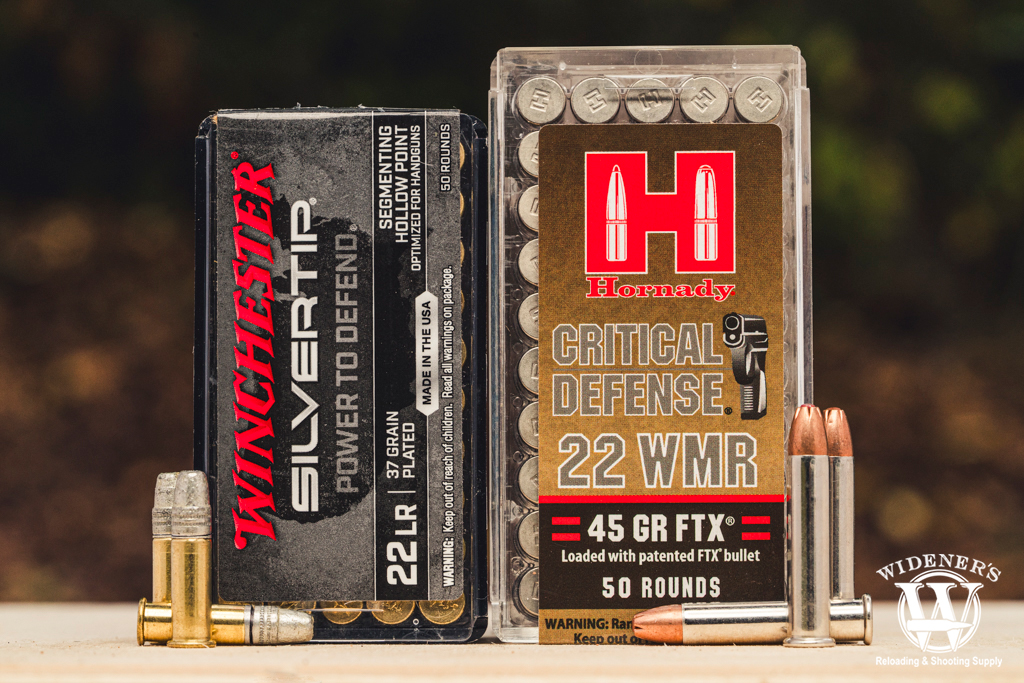
For predators in close vicinity, options like Winchester Silvertip or Hornady Critical Defense come in handy.
Although we don’t recommend rimfire for personal defense, we’d be remiss not to mention Winchester’s Silvertip line. In terms of quality and reliability, it’s head and shoulders above the competition. Designed for pistol-length barrels, the segmented hollow point bullet will send any unwanted pest to meet its maker. Hornady’s 45gr FTX round in .22 WMR is an equally impressive entry. You can also run it in a handgun, or in something like a Kel-Tec CMR 30 with a 16″ barrel.
22 LR: Winchester’s Silvertip bullet is optimized for short barrels, giving it the velocity needed for close targets.
22 WMR: Hornady’s 45gr FTX round can be fired from handguns or PDWs in close-quarters encounters.
| Caliber | Bullet Type | Bullet Weight | Velocity (Muzzle) | Energy (Muzzle) | 50 Yards (Velocity/Energy) | 100 Yards (Velocity/Energy) | 150 Yards (Velocity/Energy) |
|---|---|---|---|---|---|---|---|
| .22LR | SHP | 37gr | 1,060 FPS | 92 FT LBS | 956 FPS/75 FT LBS | 889 FPS/65 FT LBS | 712 FPS/42 FT LBS |
| .22 Mag | FTX | 45gr | 1,000 FPS | 100 FT LBS | 926 FPS/86 FT LBS | 868 FPS/75 FT LBS | 808 FPS/65 FT LBS |

Rimfire Pricing & Availability
.22LRs are not known for their power. Of course, that is exactly why they are the premier training tool in shooting. On top of that, rimfires are quite accurate at short distances, adding to their appeal. The .22LR is the standard caliber used by the Boy Scouts of America for marksmanship; the Civilian Marksmanship Program offers several programs for rimfires, and not just for junior shooters.
When it comes down to just plain dollars and cents, there is no comparison when you can buy competition-grade ammunition for around $0.04 per round for .22LR, as opposed to around $1.20 per round of .308 Winchester. Granted, it is a different type of shooting but I can sure get a lot of extra practice in when I can shoot 30 rounds for the price of one. The fundamental mechanics of shooting do not change with calibers, so rimfires are a tremendous way to hone your skills.
.22 Magnums are considerably pricier than .22LR ammunition, but still around half the price of the cheapest .223 Remington cartridges. With this in mind, we are going to step into a comparison of a couple of popular rimfire loads to determine what the advantage is in stepping up to the Magnum vice the miserly Long Rifle, and if the Magnum is the best of two worlds (being cheap and providing power close to centerfire), or falls flat on either or both accounts.
22 LR VS 22 WMR: Pros & Cons
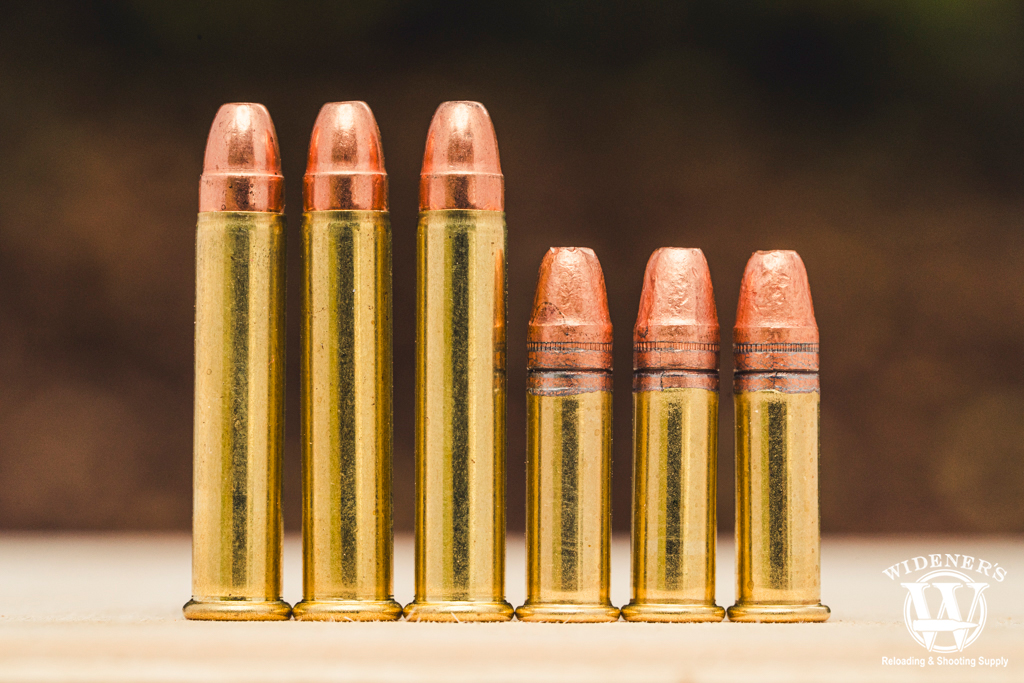
A photo comparing the .22 WMR rimfire cartridge (Left) and the .22LR rimfire cartridge (Right).
22 LR Pros & Cons
The strengths of the .22lr cannot be overstated, and they are numerous. It is not a one-size-fits-all caliber; it is far too small and underpowered for many uses. But when used within the parameters it is intended for, it is impossible to beat.
Pros:
- Price Point: There is simply no caliber more cost-effective in the shooting world than the .22LR. Period.
- Usefulness: The caliber itself is useful for just about any small varmint (skunks, raccoons, opossums, etc.) and is very accurate in the sub-50 yard range before the low-powered slug’s trajectory and velocity drops off considerably.
Cons:
- Stopping Power: The age of folks carrying tiny “mouse guns” in calibers like .22lr and .25ACP is thankfully over. With that being said, you should also be leery about using the diminutive rimfire on any of the nastier breeds of varmints, should the need arise (badgers come to mind). You should not engage two-legged predators with a .22lr unless there is NOTHING else at hand.
- Limited Range: The .22LR is a great caliber and does a lot of things well. However, engaging targets realistically beyond 100 yards is not one of them.
22 WMR Pros & Cons
It is hard not to like the .22WMR. It vastly eclipses its diminutive little brother by every metric, barks like a .223 Remington (well, not quite, but pretty close), all while being able to often use the same platforms and frames as their .22lr brethren as a base, which allows for a compact, easy-to-control firearm.
Pros:
- Extra Power: Speaking generically of the .22 WMR, it provides much more punch than their long rifle counterparts while using an identical projectile. We are speaking to the order of a nearly 50% increase in muzzle velocity and, get this, over 120% increase in muzzle energy!
- Low Recoil: For younger and smaller shooters, the .22 WMR produces negligible recoil when shot from a rifle or carbine, although the report is much more significant than anything in .22LR.
- Flat Trajectory: The .22WMR maintains a much flatter trajectory than any comparable .22LR offerings due to higher velocity and more to a dramatic increase in energy.
Cons:
- Pricing: .22 WMR ammo is generally more costly than comparable .22 LR ammunition, averaging around $0.15 per round as opposed to around $0.05 for the little guys.
- Availability: Is often an issue in-store, although ordering from Widener’s is generally a sure thing.
- Bullet Types: There is not nearly the diversity of firearms chambered in .22WMR as opposed to .22LR, especially handguns. That being said, it is comparing a fairly popular caliber with the most common caliber in the world, so it is not an issue of supply exhaustion in buying a .22WMR firearm. You just won’t have the seemingly endless options.
- Inbetweener: This is perhaps not entirely a weakness, but the .22WMR has become something of an in-between caliber. It is much punchier than the .22LR, but still vastly eclipsed by the .223 Remington. However, quality .22WMR ammunition is still around half the cost of the cheapest steel .223 Remington ammunition.
Showdown: 22 LR VS 22 WMR
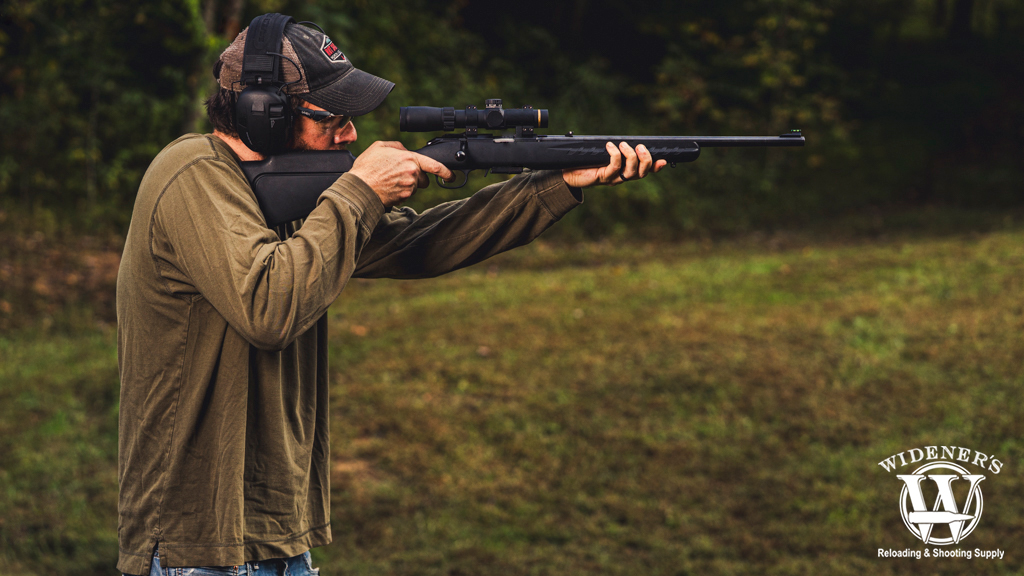
The .22 WMR is more powerful, but the .22LR cartridge is a cost-effective option better suited for most applications.
There is no real argument against the .22LR, so long as you keep it in its lane. It is accurate, cheap, and plentiful, affords tons of choices of firearms, and is so fun and inexpensive that you can stay on the range all day for about $20. The .22 WMR is very down to business and packs a serious punch for lightweight varmints, and takes it out much farther than the .22LR while not getting jostled by the wind as the .17s tend to be.
Firearms in .22WMR are usually a little more costly than those in .22LR, but well below those in .223 Remington. The Winchester Super-X Hyper Velocity squeezes as much performance as you can muster out of the diminutive caliber, and the Super-X 40gr JHP in .22WMR is a fine all-purpose load to zero in a scope and smoke those vermin who have been causing problems. My advice? Buy a rifle in each caliber! It’s better to have options when it comes to pest control.


